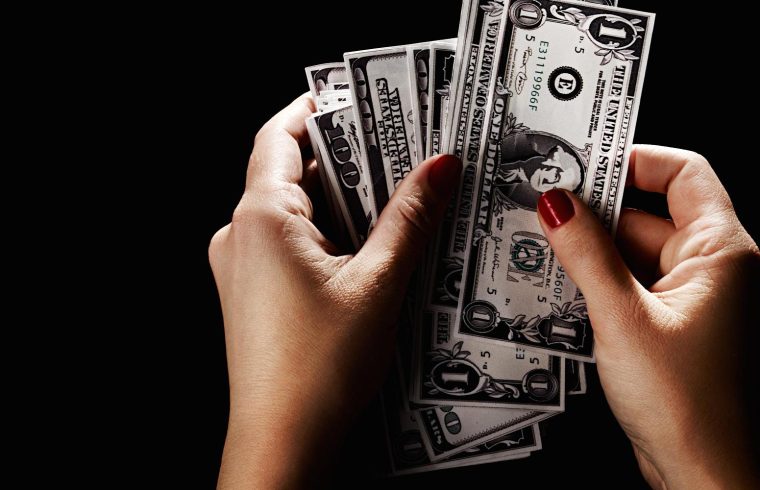
Given that the average bank checking account is still paying close to bupkes — about 0.06 percent — there is no arguing that sitting in cash is a lousy investment.
In fact, it’s always been a lousy investment. Not only does cash (the green in the chart below) dramatically lag the long-term return for stocks and bonds, it doesn’t even keep pace with inflation (red.)
Yet we love some liquidity. According to money manager BlackRock , affluent investors (those with more than $ 250,000 in investable assets) keep more than 40 percent of assets in cash. Fresh research makes the case that the emotional payoff may be worth the opportunity cost.
In a paper called “How Your Bank Balance Buys Happiness: The Importance of ‘Cash on Hand’ to Life Satisfaction,” researchers stacked up the bank account balances for nearly 600 Brits against their reported levels of happiness.
Turns out that liquidity makes us feel better.
“Holding investments and not being in debt are both associated with greater financial well-being, but having cash “on hand” is meaningful above and beyond those measures of wealth,” wrote co-authors Peter Ruberton and Sonja Lyubomirsky of the University of California, Riverside, and Joe Gladstone at the University of Cambridge.
“While many individuals believe that increasing income or total wealth will improve their happiness, they may also benefit by building a financial buffer in their checking and savings accounts. We found this buffer to be associated with improved well-being regardless of how much a person earns, invests, or owes,” wrote the academics.
Bridget Grimes, founder of WealthChoice, a San Diego financial planning firm, says she has numerous clients whose cash positions are a multiple of the standard recommendation to keep three to six months of living costs liquid. “I am not looking to convince clients that three to six months is what they must do. If owning more cash makes you feel good and sleep at night that’s what we need to do,” said Grimes.
That’s not to suggest there is a free lunch to be had here. What makes you feel more secure is actually losing its purchasing power over time. (Scroll back up to the chart for a reminder of how cash doesn’t keep pace with inflation.) “The key is to plan around holding more cash,” says Grimes.
- Include the excess cash as part of your bond allocationin your investment portfolio. For instance, if your investment asset allocation calls for 60 percent to be invested in stocks, and 40 percent in bonds, consider your excess cash as part of the 40 percent. “If I have a client with 30 percent of her assets in cash and a goal of having a 60/40 allocation, we might end up investing just 10 percent more in bonds,” said Grimes.
- Earn at least 1 percent on your emergency money. No one is ever going to get rich sitting in cash, but that’s no excuse for settling for nothing. The average bank savings account currently pays 0.06 percent in interest. But you’re just a few clicks away from earning about 15 times that. “You can easily earn 1 percent interest at an online bank,” said Ken Tumin, founding editor of DepositAccounts.com, a website that tracks the best bank deals for consumers.
Granted, today’s best savings deal may not be as great three or six months down the line. MaxMyInterest.com has an app just for that. Its service tracks the best savings deals at six online banks and automatically moves client cash into the highest yielding opportunities.
(The online banks: Ally, American Express Bank, Barclays, Capital One 360, Goldman Sachs Bank and UFB Direct.) The average Max client earns about 1.05 percent interest. Even after paying the 0.08 percent annual fee, you’re well ahead of what you can earn at your brick-and-mortar bank.
If you have a hefty cash position, you likely don’t really need to keep 100 percent of it in a super-liquid savings account. Tumin suggests keeping just what you need for near term (read: emergency fund) security in an online bank savings account that you can link to your checking account. Then pile the rest of your cash in higher yielding certificates of deposit (CDs).
Deposit at least $ 25,000 in a three-year CD with Synchrony Bank and you lock in a 1.85 percent yield. A five-year CD at Ally pays 2.25 percent. That’s right on par with what a 10-year Treasury note currently pays. Given that the money isn’t your emergency stash, chances are you won’t need to cash out early, but if you do, Ally’s withdrawal penalty is a mild five months of interest. Synchrony’s is a stiffer six months for a three-year CD. (This calculator churns out the impact of early withdrawals) Tumin isn’t worried about locking in ahead of anticipated Fed rate hikes.
“Yes, rates are going up, but the expectation is that the increases will be mild. You won’t regret earning 2 percent or so on your cash,” he said.
More from Your Money Your Future:
Not saving for retirement tops Americans’ greatest regrets






